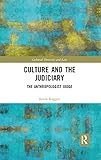Culture and the Judiciary : The Anthropologist Judge / by Ilenia Ruggiu.
Material type: TextSeries: Cultural Diversity and Law: Publisher: Boca Raton, FL : Routledge, [2018]Copyright date: ©2019Edition: First editionDescription: 1 online resource (270 pages) : 3 illustrations, text file, PDFContent type: text Media type: computer Carrier type: online resourceISBN: 9780429433474(e-book : PDF)Subject(s): LAW / Courts | LAW / Jurisprudence | Multiculturalism -- Law and legislation -- Cases | Law and anthropology | Minorities -- Legal status, laws, etcGenre/Form: Electronic books.Additional physical formats: Print version: : No titleDDC classification: 340.115 LOC classification: K487 | .C8Online resources: Click here to view Also available in print format.
TextSeries: Cultural Diversity and Law: Publisher: Boca Raton, FL : Routledge, [2018]Copyright date: ©2019Edition: First editionDescription: 1 online resource (270 pages) : 3 illustrations, text file, PDFContent type: text Media type: computer Carrier type: online resourceISBN: 9780429433474(e-book : PDF)Subject(s): LAW / Courts | LAW / Jurisprudence | Multiculturalism -- Law and legislation -- Cases | Law and anthropology | Minorities -- Legal status, laws, etcGenre/Form: Electronic books.Additional physical formats: Print version: : No titleDDC classification: 340.115 LOC classification: K487 | .C8Online resources: Click here to view Also available in print format.Includes bibliographical references and index.
Introduction -- Part I: Descriptive Analysis: The use of culture by judges -- Chapter1: In medias res: the cases -- 1. Parents who kill their children -- 2. Men who abuse women -- 3. Concepts of child care -- 4. Culture and indigenous peoples -- Chapter 2: The resolution of multicultural conflicts in Western comparative jurisprudence. In search of a common tradition and reliable legal techniques -- 1. Topica: in search of recurring themes (topoi) in Western judicial reasoning -- 2. The distinction between culture and religion in constitutional law: the topos of God -- 3. The emergence of cultural and religious tests -- 4. The cultural test of the United Nations Human Rights Committee: the topos of graduation -- 5. Canadian jurisprudence -- 6. US jurisprudence -- 7. English jurisprudence: the topos of time -- 8. Italian jurisprudence -- 9. German jurisprudence: the topoi of harm and consent -- 10. The jurisprudence of the European Court of Human Rights: the topoi of diversity as a public value and of the impact on the majority -- 11. From culture to gender. The topos of female equality -- 12. Toward a common Western legal tradition on the resolution of multicultural conflicts? -- Part II: Deconstructive Analysis: A critical reading of culture -- Chapter 3: Concepts of culture in anthropology and judicial reasoning -- 1. Deconstructive analysis of the concept of culture -- 2. Culture as artifact. Reifications, synecdoches, metonymies in judicial reasoning: the veil and the crucifix -- 3. Culture as the evolution of civilization. Primitivism and the judge faced with the "time factor" -- 4. Culture as exoticism. The irresistible charm of the "different" on the judge -- 5. Culture as relativism. The abandonment of reasoning in modus iuridicus in favor of modus anthropologicus -- 6. Culture as an attribute that only the other has. The "culturalization" of foreigners -- 7. Culture as interpretation and translation. The search for the "cultural equivalent" in the host culture -- 8. Culture as authenticity. The judge in search of "pure" cultures -- 9. Culture as creolization. Judicial recognition of cultural transformations -- 10. Panculturalism. "Blaming culture for bad behavior" in judicial reasoning -- 11. Culture as ethnosphere. Cultural diversity as a value for the whole society -- 12. Turning away from culture in anthropology. The crisis of multiculturalism in the law -- 13. Culture as patriarchy: the feminist objection to culture. The shifting from "culturally motivated crimes" to "gender crimes" in the law -- 14. Relevance of the concept of culture and endorsement of a new relation between law and anthropology -- Part III: Prescriptive Analysis: A proposal of a cultural test -- Chapter 4: A test as contribution to the resolution of multicultural conflicts -- 1. Cultural tests in scholarship -- 2. An overview of the structure of the proposed test -- 3. Topoi not included: antiquity of the practice, distinctiveness, time of residence -- 4. The premise of the test: to take the other's perspective -- 5. The test -- 6. How to use the test -- 7. The role of cultural expertise within the test -- 8. The test's risks: technicality, formalism, bureaucratization, reductionism of reality -- 9. How to introduce the test into the legal systems -- 10. Applying the test to concrete conflicts -- 11. Re-reading the Kimura case -- Conclusions -- Appendices.
How can jurists resolve multicultural conflicts? Which kind of questions should judges ask when culture enters the horizon of the law? Are they then called to become anthropologists? Through the analysis of hundreds of cases produced through decades of multicultural jurisprudence, this book reconstructs the constitutional and anthropological narratives and the legal techniques used by Western judges to face the challenges posed by multiculturalism: from Japanese parent–child suicide to the burqa, from Jewish circumcision to Roma begging, from kissing a son on his genitals to the claim of indigenous people to fish salmon in natural parks, the book brings the reader into a fascinating journey at the crux of the encounter between the relativism of anthropology and the endeavor toward a democratic coexistence pursued by the law. After identifying the recurrent themes or topoi used by judges and lawyers, this book critically analyzes them, evaluates their persuasive power and suggests a "cultural test" that gathers together the crucial questions to be answered when resolving a multicultural dispute. The "cultural test" is a matrix that guides the judge, lawyers and legislatures across the intricate paths of multiculturalism, to assure a relational dialogue between the law and anthropology.
Also available in print format.

